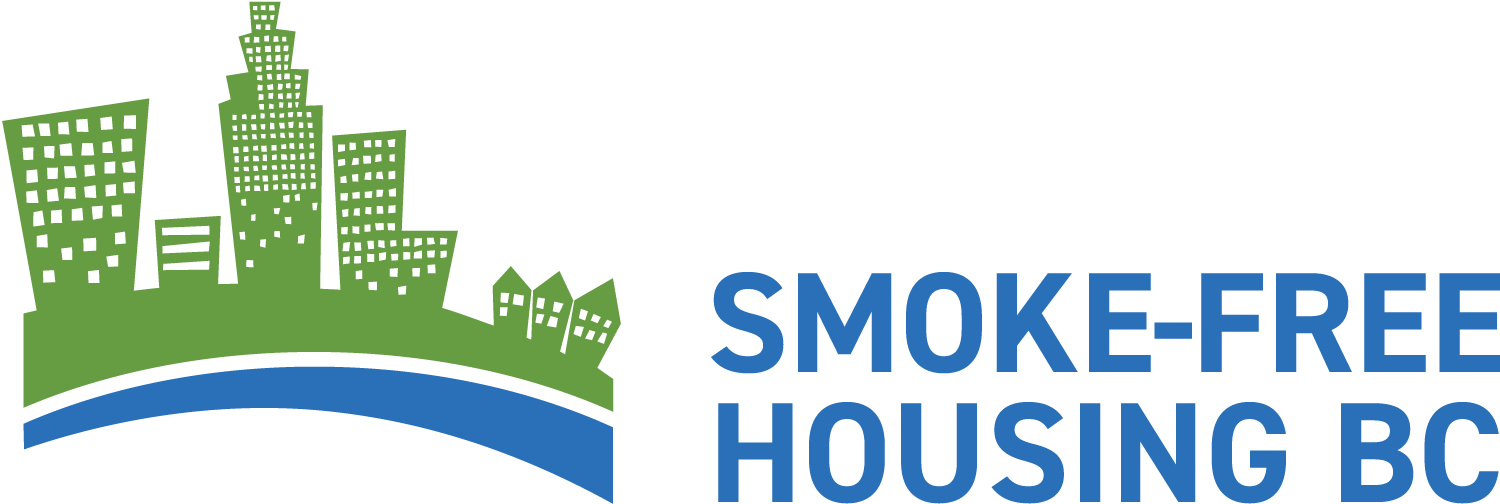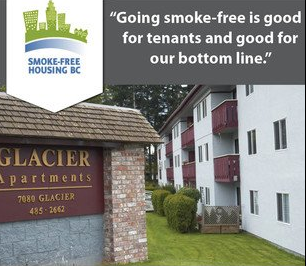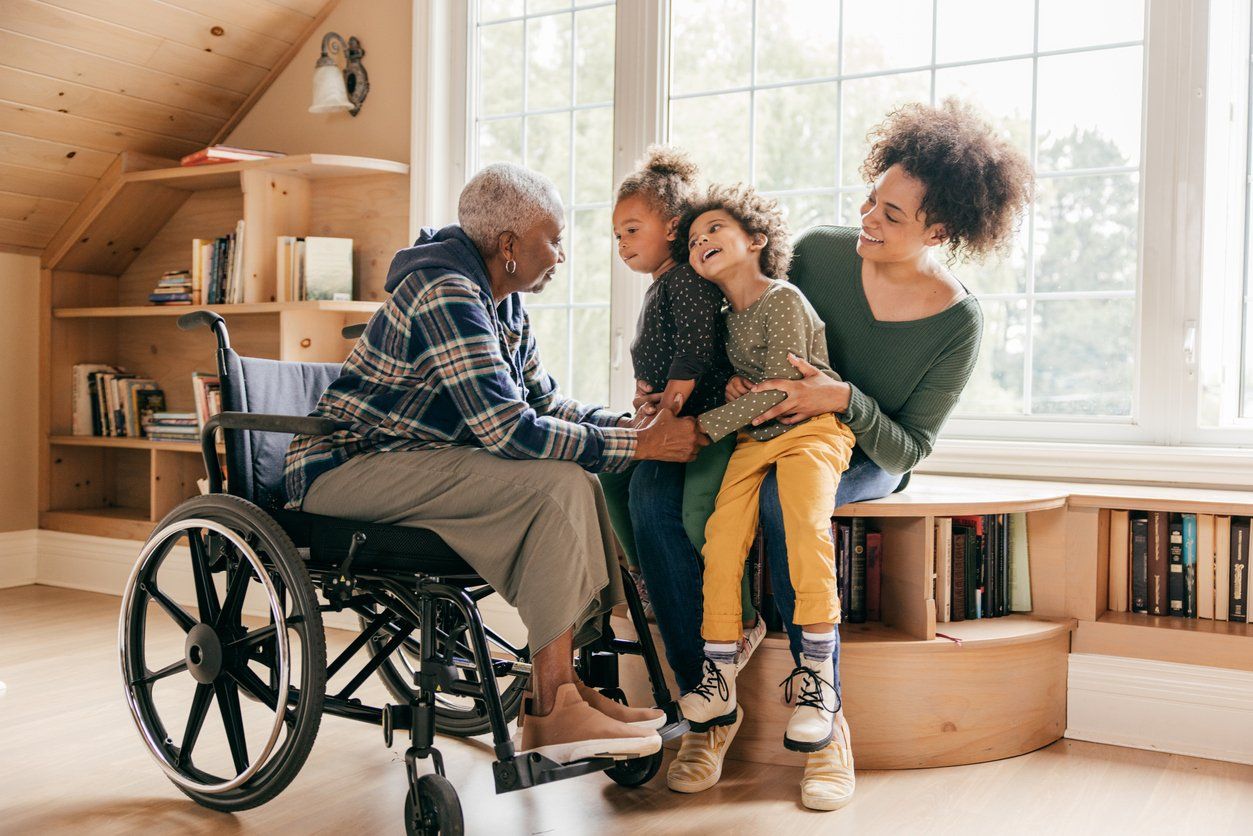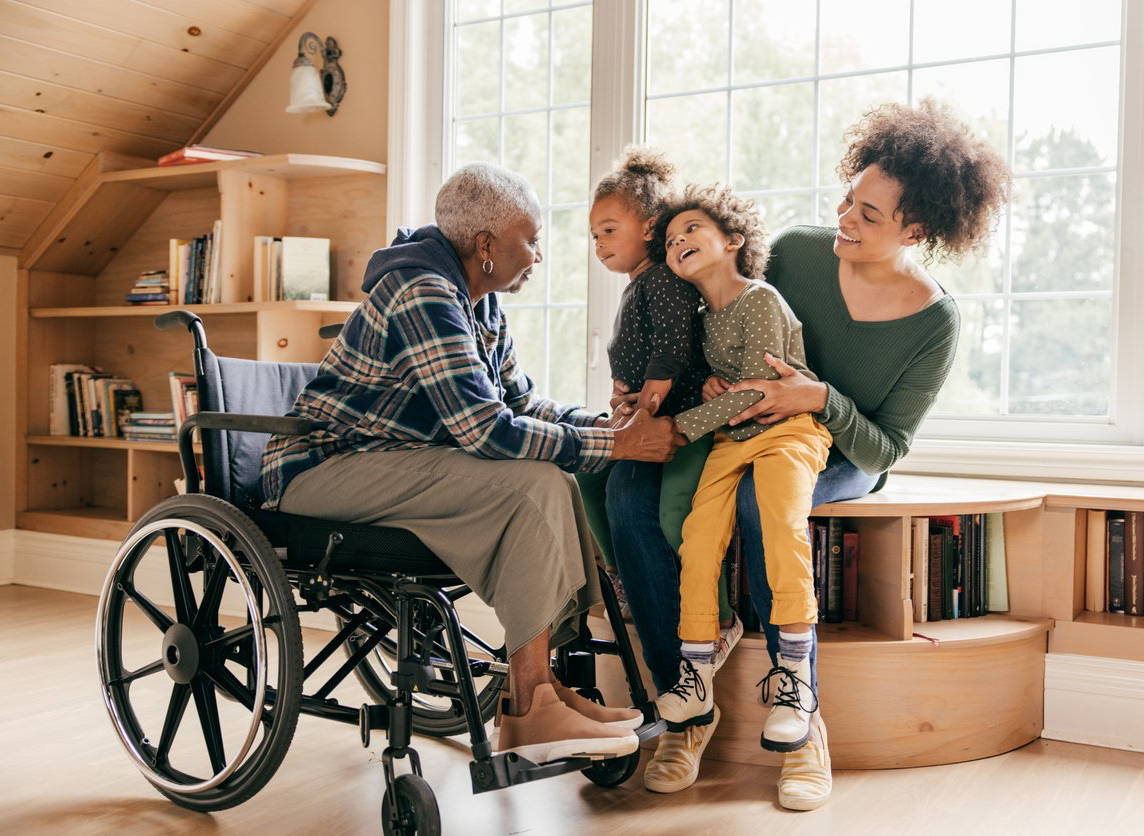Landlord Resources
Steps to Implement
3 Easy Steps to Go Smoke-Free
Here are steps for developing and implementing your smoke-free policy, including sample policies, tenant communications and other tools to help you successfully go smoke-free.
pdf download - LANDLORDS - How to Implement a Smoke-Free Policy for existing & new market-rate housing - for printing
At present there are only a handful of smoke-free choices in the affordable housing market for British Columbians who want and need a smoke-free home. It could be argued that the lack of smoke-free choice is discriminatory, given the disproportionate burden of chronic disease and disability faced by low-income British Columbians. A safe and smoke-free environments should be a basic right for all people, but especially for those who don't have any other housing options.
Further, it should be emphasized that a smoke-free policy in affordable housing is NOT about denying occupancy to anyone who smokes, evicting smokers from their homes, or forcing smokers to quit. An individual’s smoking status should not be used to determine eligibility for applying for or residing in affordable housing. Current and prospective tenants need to know that they are allowed to smoke, just not in the areas that have been designated non-smoking.
In consultation with the BC Non-Profit Housing Association, our organization worked with a small number of non-profit housing providers to pilot the implementation of smoke-free policies in existing residential buildings. Based on the results of this pilot, we developed procedures outlined in this section tailored to the affordable housing sector. However, adopting a no-smoking policy for affordable housing involves many of the same steps suggested for existing market-rate buildings in the previous section, plus a few additional considerations.
4 Steps to Go Smoke-Free
The pdf document for printing below these drop-down fields contains a more detailed description of the 4 steps for going smoke-free.
pdf download - Landlords - How to Implement a Smoke-Free Policy: Steps for Affordable Housing Providers - for printing
How to Address Complaints of Second-Hand Smoke

Breathing unwanted smoke is more than an inconvenience
Over one-half of residents who live in multi-unit housing have experienced unwanted tobacco and cannabis smoke infiltrating their homes from neighbouring units or balconies. The intrusion of toxic smoke is more than an inconvenience. It is a serious health hazard that causes heart disease, respiratory illnesses and cancer in non-smokers. It is also hazardous for the thousands of British Columbians living with pre-existing medical conditions that are worsened by exposure to second-hand smoke.
Tenants have a right to Quiet Enjoyment
Under the Residential Tenancy Act, all tenants are entitled to quiet enjoyment, which includes the right to be free from unreasonable disturbances. This could include being free from breathing toxic substances such as second-hand smoke on a frequent and on-going basis. Courts and Tribunals in BC have found that second-hand smoke can constitute a breach of quiet enjoyment, even in buildings where smoking is allowed in private units and/or on balconies.
Landlords have a duty to address second-hand smoke complaints
Regardless of whether smoking is permitted on the premises, a landlord has a duty to address all complaints of second-hand smoke. Landlords should be aware that the ability to smoke is not absolute, and is limited by the right to quiet enjoyment of neighbouring tenants. In many cases landlords are reluctant to address complaints about second-hand smoke where smoking is permitted in some or all rental units. But they would be wrong to assume that they have no authority to address these complaints. Addressing the issue of second-hand smoke is similar to addressing the issue of loud music. While playing music is allowed in private units, when it’s played too loudly and significantly interferes with the quiet enjoyment of other tenants, landlords can take steps to stop this intrusion, including last resort steps to end the tenancy.
If tenants can show that second-hand smoke is causing an unreasonable disturbance, threatening their health and substantially interfering with the enjoyment and use of their home, then landlords have a duty to take all reasonable steps to resolve the problem. Further, Landlords are subject to claims under Section 8 of the Human Rights Code, which states that everyone has the right to be free from discrimination when renting an apartment, house, co-op unit or other space. if a tenant can show that they have a medical condition or disability that is negatively impacted by exposure to second-hand smoke, that tenant could establish a case of discrimination. Once discrimination is established, the onus shifts to the landlord to justify its actions, including showing that it has accommodated the complainant up to the point of undue hardship.
Increasingly, smoking complaints are ending up before the Residential Tenancy and Human Rights Tribunals, where landlords have been found liable for failing to deal with second-hand smoke complaints and ordered to pay costs. Given the costs associated with investigating and attending tribunals, landlords may want to consider implementing a 100% smoke-free policy, a definite win/win for landlords and residents. See the section above on implementing a 100% smoke-free policy.
This section provides steps and useful resources for landlords to adequately respond to complaints of second-hand smoke.
Steps to Address Second-Hand Smoke Complaints
pdf download - LANDLORDS - How to Address Second-Hand Smoke Complaints - for printing
Laws & Legal Information
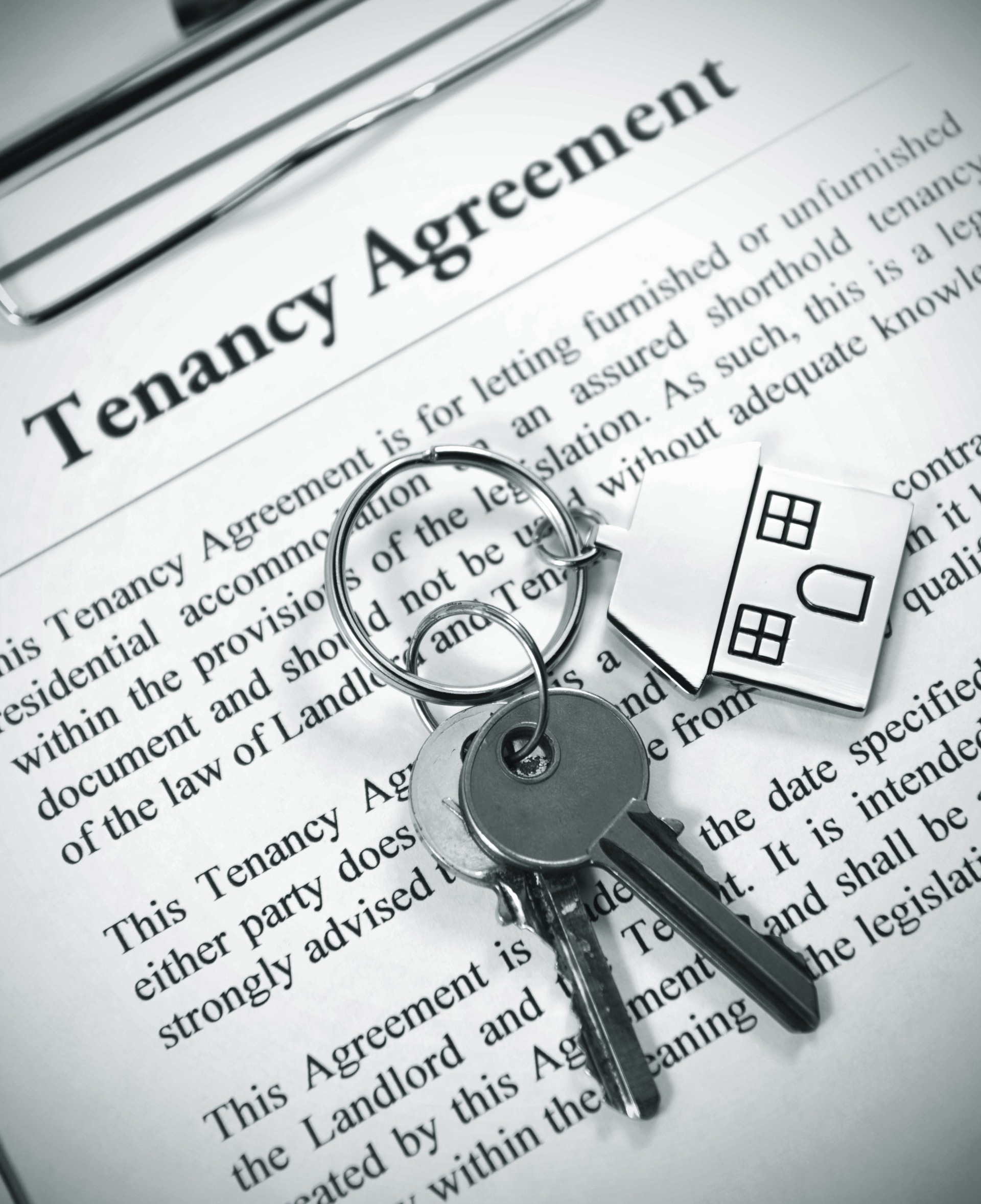
It's Your Choice & Completely Legal
We hear from many landlords that they would love to implement a smoke-free policy in their buildings, but are concerned they would be difficult to enforce. Others are under the mistaken impression that no-smoking policies are discriminatory. The good news is that smoke-free policies are legal, non-discriminatory AND enforceable.
A non-smoking policy does not exclude people who smoke; they simply must comply with the no-smoking policy on the premises. Just as you can prohibit pets or barbeques in your rentals, you can also have a policy that bans smoking inside units, balconies and the entire property. Going smoke-free protects your investment, and the health of your residents.
This section describes provincial legislation and local government bylaws that govern smoking in residential buildings in BC.
Provincial legislation:
- The Residential Tenancy Act
- The Tobacco and Vapour Products Control Act
- Cannabis Control and Licensing Act and regulations
- The Human Rights Code
- Municipal Bylaws:
- Many local governments have Smoke-Free Bylaws to restrict smoking in public places, and some laws are stricter than provincial legislation.
- Enforcement of government smoke-free legislation
- Case law highlights
&
common questions
on second-hand smoke in multi-unit housing
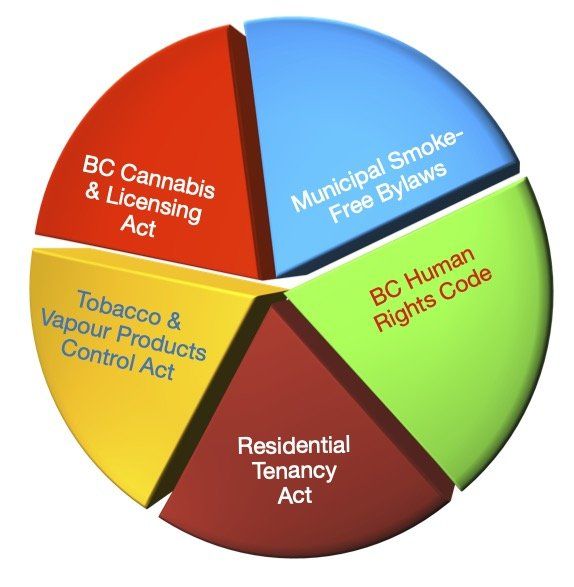
BC Laws
This section provides a brief description of the laws and regulations that govern smoking in residential multi-unit housing in BC.
pdf download - LANDLORDS - BC Laws that Govern Smoking & Cannabis in Residential Multi-Unit Housing - for printing
Remember that smoke-free policies restrict smoking - not smokers. A smoke-free policy does not mean you can't rent to smokers; they just have to smoke outside, which many smokers already choose to do. Further, while smoking remains a personal choice among adults, non-smokers have not made this choice, and have the right not to be exposed to toxic smoke in their homes. Landlords have the right to set limits on how residents use the property, and banning smoking is similar to banning pets, gas barbeques or restricting noise. A smoke-free policy is another way for landlords and property managers to protect resident health, reduce disturbances to residents and protect their property.
As a result of decisions supporting resident's rights to be protected from exposure to second-hand smoke, increasing numbers of housing providers are choosing to implement 100% smoke-free policies. Here are a few decisions that support this choice:
- Bowker v. Strata Plan NWS 2539, 2019 BC Human Rights Tribunal: A strata was ordered to pay $7500 for failure to accommodate an owner with a disability that was negatively impacted by exposure to second-hand smoke.
- 2018 Residential Tenancy decision by Saskatchewan Court:
The Court
recognized tenants' right to be protected from second-hand smoke. The landlord (Regina Housing Authority) was ordered to compensate tenants of 3 different apartment buildings for failure to address second-hand smoke complaints. As a result of this decision, on June 20, 2018, the Saskatchewan Government announced that all social housing in the province would be 100% smoke-free effective August 2018.
- Leary v. Strata Plan VR1001, 2016 BCHRT 139 (CanLII): The Strata Corporation was ordered to pay $7500 damages to the owner impacted by exposure to second-hand smoke, despite the fact that smoking was allowed in the building.
- BC Residential Tenancy Branch: Dispute codes: CNC, FF October 19, 2015: Landlord’s notice to terminate tenancy upheld due to cannabis second-hand smoke nuisance – despite there being no term in the tenancy banning smoking - and the offending tenants claimed they had approval for medical cannabis. The landlord established sufficient cause to end the tenancy of the smoking tenants and dismissed the smoking tenant’s application to cancel the Notice To End Tenancy.
- The Owners, Strata Plan NW 1815 v. Aradi, 2016 BCSC 105: The BC Supreme Court upheld a Strata Corporation’s right to adopt bylaws which completely prohibited smoking without grandfathering existing smokers. Despite the smoker claiming his smoking was a disability to be accommodated, the Judge found that in balancing the rights of the neighbours not to be exposed to second-hand smoke, Mr. Aradi was ordered to smoke outside and off the property.
- The Owners, Strata Plan LMS 2900 v. Mathew Hardy, 2016 BC Civil Resolution Tribunal: upheld a Non-Smoking Bylaw banning the smoking of medical cannabis. An owner sought accommodation for his disability and be exempted from the bylaw. The Tribunal found that there was no reason he couldn’t ingest his medicine rather than smoke it and was ordered to refrain from smoking in his unit and the entire property.
For more information on the benefits of going smoke-free, visit Why Go Smoke-Free.
For more examples of case law on second-hand smoke, see the pdf below this section for Case Law Highlights: Second-Hand Smoke Complaints in Strata Complexes. Many of these cases are used to support tenants or landlords who have applied to the Residential Tenancy Branch or the Human Rights Tribunal for restitution.
pdf download -
Case Law Highlights: Second-Hand Smoke Complaints in Strata Complexes - for printing
Common Questions
This section provides information on common questions we receive from landlords about creating smoke-free policies, addressing complaints of second-hand smoke and legal implications of enforcing breaches of quiet enjoyment related to second-hand smoke.
NOTE:
This section is for informational purposes only and should not be considered legal advice.
pdf download - LANDLORDS - Common Questions - for printing
Tools & Resources
This section provides a range of tools, downloads and links to assist in the development, implementation and enforcement of smoke-free policies in residential multi-unit housing.
Tools
pdf - Sample Resident Manager Notification Letter
pdf - How to Implement a Smoke-Free Policy for Existing & Market-Rate Housing
pdf - How to Implement a Smoke-Free Policy for Affordable Housing Providers
pdf - Landlords - Common Questions
pdf - How to Address Second-Hand Smoke Complaints
pdf - BC Laws That Govern Smoking & Cannabis in Residential Multi-Unit Housing
US Websites
US Indoor Environmental Engineering: Experts in indoor air quality
US Environmental Protection Agency: Tips to reduce second-hand exposure in multi-unit dwellings
US Department of Housing & Urban Development:
Implementing a Smoke-Free Policy in Public Housing
